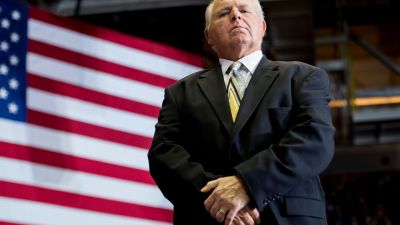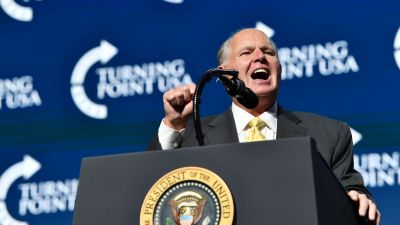
Pope Francis walks on stage at the US border, before celebrating mass at the Ciudad Juarez fairgrounds, on February 17, 2016. (GABRIEL BOUYS/AFP/Getty Images)
Given how quickly the news cycle spins these days, Pope Francis’ extemporaneous criticism of candidates who would rather build walls than bridges, prompted by a reporter’s question about Donald Trump, already seems like ancient history. And even Justice Antonin Scalia’s death a few days later is fading into the political fog.
But these two disparate events tell us something about the media coverage of the current election campaign, or, more accurately, they tell us about something sorely lacking in that coverage: the issue of values. Aside from Ted Cruz and Marco Rubio proclaiming their own virtuous values, this may be the last time during this election that you’re likely to hear that word.
I have already griped here that journalists give us virtually no reporting on policy. But that doesn’t mean all the coverage is horse race stuff. Occasionally, when the spirit moves them, the media get all grandiloquent on us and purport to examine the person inside the candidate.
Of late, New York Times columnist David Brooks has been particularly interested in manners — bad manners. He wrote a whole column recently about Trump’s, which, in Brooks’ view, seem to be the candidate’s major failing. Boy King Marco Rubio professes to believe in most of the same scorched earth pronouncements as Trump, but he is such a nice, polite young man when he says them that he gets a pass from the MSM. It is what you might call the “politics of etiquette,” with Rubio as its Eddie Haskell.
And then we get the typical election-year blather about character and how it supposedly reveals who a candidate really is. This is a particular specialty of the right-wing press, who seem to think that if you are a Republican, you have character; if you are a Democrat, you don’t. Just Google “Hillary Clinton” and “character” and see what I mean.
I am not sure that manners or character have all that much to do with governance. (OK, I might make an exception for Ted Cruz.) Some of our best presidents seem to have had questionable character, and some – think of Andrew Jackson – had bad manners. But values are different. Values define who we are, how we think about the world, and, most important of all, how we treat others. A candidate’s values are not only important; they may be more important than anything else in the campaign, and possibly the surest guide to what that candidate would do in office. Policies may change. Values are bedrock.
I think that’s what Pope Francis was saying when he was invited to criticize Trump. Whether or not you believe he should have waded into that muddy political swamp, Francis wasn’t really being political. He was addressing the fact that any individual who was more interested in keeping out people in distress rather than reaching out and drawing them in was, in his estimation, not someone who is living Christian values.
Yet for the media, this was framed as a kind of wrestling match. “Trump vs. the Pope” was the headline everywhere. It made for great drama, but it missed the point. This wasn’t about a religious figure taking on a political windbag. This was about the kind of values we want our leaders to have and the kind of people we want to be. That is much worthier of discussion than Trump vs. the Pope, mano a mano.
Similarly, I was struck by the encomia lavished on the late Justice Scalia. He was praised to the skies by just about everyone in the media, and not just the conservative media. But you might have noticed something missing in these eulogies that, while praising his intellect, wit and acerbity, said not a single word about his values.
It was left to The New Yorker’s Jeffrey Toobin to spoil the lovefest and examine the Scalia behind the legal sanctimoniousness and heartstring-tugging personal anecdotes. Here is Toobin’s assessment:
Scalia devoted his professional life to making the United States a less fair, less tolerant, and less admirable democracy. Fortunately, he mostly failed. Belligerent with his colleagues, dismissive of his critics, nostalgic for a world where outsiders knew their place and stayed there, Scalia represents everything that President Obama should avoid in a successor.
That is the value assessment of Scalia, a bully who detested homosexuals, refused to stay the death penalty even where there was reason to believe the convicted was innocent, and never ruled for the powerless and afflicted when instead he could rule for the powerful and the afflicting. This isn’t a matter of jurisprudence. It is a matter of basic human decency, and it is a matter the media, save Toobin, refrained from addressing.
That’s because journalists don’t seem comfortable talking about values. To many of them, values probably seem squishy. They seem to depend on whoever happens to be enumerating them, and they have, in truth, been devalued by the conservative trumpeting of “family values,” as declaimed by homophobes like the Family Research Council, which was named a hate group by the Southern Poverty Law Center.
Moralism is not morality. What’s more, values are especially susceptible to the media’s old symmetry ploy that makes sure whatever they put on one side of the equation is balanced by the other side, so that conservative values and liberal values are always in constant equipoise.
But this pretense of equivalence is just another journalistic dodge. Values aren’t really squishy, and conservative values and liberal values aren’t really morally equal, though I suspect conservatives want us to think they are.
You will never hear this in the MSM, but here goes: There actually is such a thing as good values and bad values, values that emanate from the best part of us, those better angels, and values that emanate from the worst. How do we know? Because our parents taught them to us. They taught us compassion, tolerance, charity, empathy for the less fortunate and those in need.
These values were and are unimpeachable, and while they’re certainly not the only values we learned, I don’t recall hate, hardheartedness, or self-righteousness being on the list. That was Pope Francis’ real message when he was asked about that Mexican wall Trump promises to build.
To put a sharper point on values, try applying the Golden Rule to our politics. How many Americans would like to be treated the way the Republicans vow to treat undocumented immigrants by deporting them or breaking up their families? How many would want to be on the other side of health insurance when the Republicans defund Obamacare? How many would want their children and grandchildren to live in a world of climate change that the Republicans deny exists? How many would like to be denied the right to vote because Republicans have pressed for voter suppression laws under the guise of protecting us from non-existent fraud? How many would want to lose food stamps when they need them to feed their children?
See what I mean? There are bad values. We just don’t hear about them in the media.
Perhaps there was a time when Republicans and Democrats, at least moderate Republicans and northern Democrats, more or less shared those hallowed values, if not the means to realize them or the priorities assigned to them. Historians even talk of a “liberal consensus” in the 50s and 60s around which both parties largely coalesced.
Obviously, things are different now. What’s remarkable is not that no Republican candidate today espouses values that could pass the old Golden Rule test. It’s that the media won’t talk about it, which is one reason why our elections devolve into playground fights and name-calling.
So here is my suggestion for this campaign season: Just as we need a “knowledge-based” journalism in which reporters provide substantive information to help us assess candidates, we need an “impact-based” journalism that asks and describes how policies will affect both ordinary people and the most vulnerable among us — a journalism that restores to our political discourse a discussion of values that has been too long absent. Not to do so is not only a grave dereliction of the press’ duty; it is a moral breach.
Our politics, I suspect, would look very different if the media provided information on policies and an analysis of their effects. Republicans just better hope journalists continue to refuse the challenge.
The views expressed in this post are the author’s alone, and presented here to offer a variety of perspectives to our readers.




